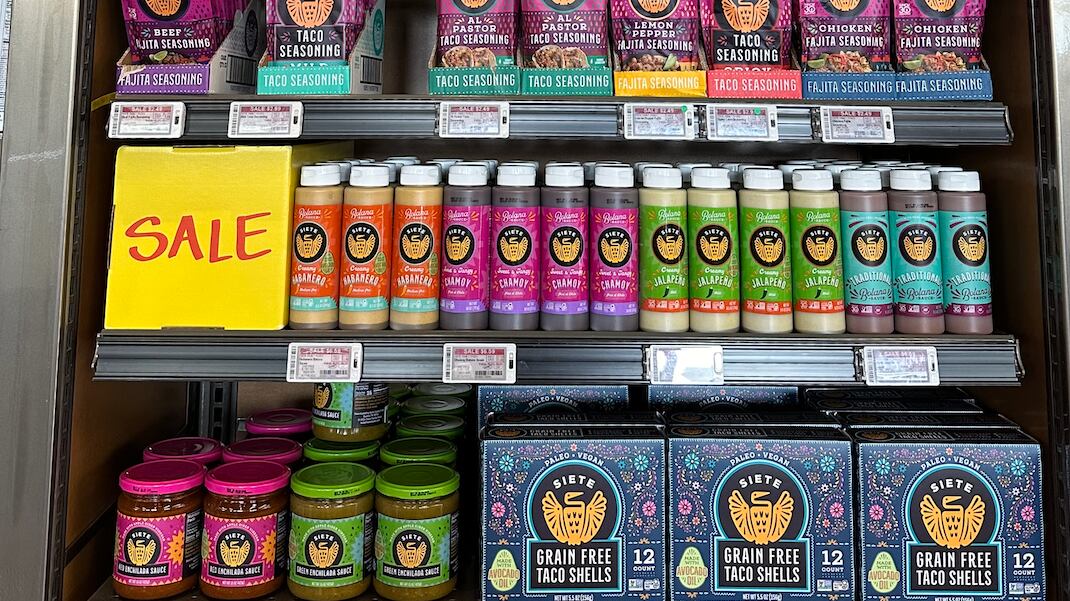PepsiCo is buying Siete Foods, the Texas-based maker of grain-free tortillas and chips, in a $1.2 billion deal, the Frito-Lay owner said, expanding its portfolio into health-conscious and specialty food markets.
Over the last decade, there’s been a surge in demand for products that cater to dietary restrictions such as gluten-free, grain-free, and paleo-friendly options. Siete, founded by the Garza family in 2014, has rapidly gained a loyal following for its range of grain-free tortillas, tortilla chips, and sauces, and is known for using nutrient-dense ingredients like almond flour and cassava.
Veronica Garza, Siete’s co-founder, was diagnosed with multiple autoimmune diseases, including lupus, and to combat her health struggles, she began to use food as medicine. She tested recipes alongside her mother to create their first product, an almond flour-based tortilla, according to the company’s website.
“I don’t really trust PepsiCo with gluten-free products considering that they’ve made so many bad food options that have caused severe health issues,” said Seeran Ajemian, USC alumna who also has an autoimmune disease.
Ajemian was 19 when she was diagnosed with Hashimoto’s disease and has since adopted a gluten-free diet to reduce inflammation and ease her symptoms of fatigue and brain fog, along with medication that she will take for life.
Siete products have been a staple in Ajemian’s diet because of the difficulty in finding high-quality and reasonably priced gluten-free products.
Owned and managed by seven family members, Siete has tried to build itself as a clean-label company but some loyal consumers raise concerns that the deal could dilute the grain-free tortilla chip maker’s brand, with recipe changes or a move away from its founding mission.
Claire Fogarty, a food blogger of @Clairecancook and who has been gluten-free and dairy-free for nine years, has been buying Siete products since 2015.
“With the family business story on the back of the packaging, it always felt like a personal brand,” Fogarty said. “I’m happy for the family that now they are able to achieve their dreams and have this payout, but I’m sad to see this smaller business go to such a large giant in the market.”
Fogarty said she also has concerns about the brand’s future and if product lines will change or if her favorite product — churro strips — will be dropped.
Functional medicine practitioner Julia Paul said she will be closely watching how the merger unfolds to make sure she is continuing to offer her clients products that are healing instead of harmful.
“Siete is a brand I love and recommend for its clean standards, so while it’s great that it might become more accessible and affordable, we need to stay alert for any potential changes to their ingredients in the coming months,” Paul said.
It’s too soon to tell if the Siete-PepsiCo deal is a new industry trend, but as weight loss drugs like Ozempic change consumer preferences for healthy offerings, mergers and acquisitions like this one might pick up, according to Gerard Hoberg, finance and business economics professor at USC Marshall.
“The goal is lifestyle changes to sustain the weight loss which could feed a push toward healthier offerings more broadly,” Hoberg said, who added he sees the acquisition as a positive opportunity for Siete especially because of the potential synergies between Siete Foods and PespiCo.
“Deals like this often make sense even without a higher-looking strategy like ‘going healthy’ as Siete’s brand portfolio is very attractive and Pepsi surely can greatly ramp up distribution given their very strong distribution network,” Hoberg said.
Increased distribution can also be important to Siete’s strategy. PepsiCo may aid Siete’s expansion to places like Mexico, which would have remained untapped for the small business, Hoberg said.
